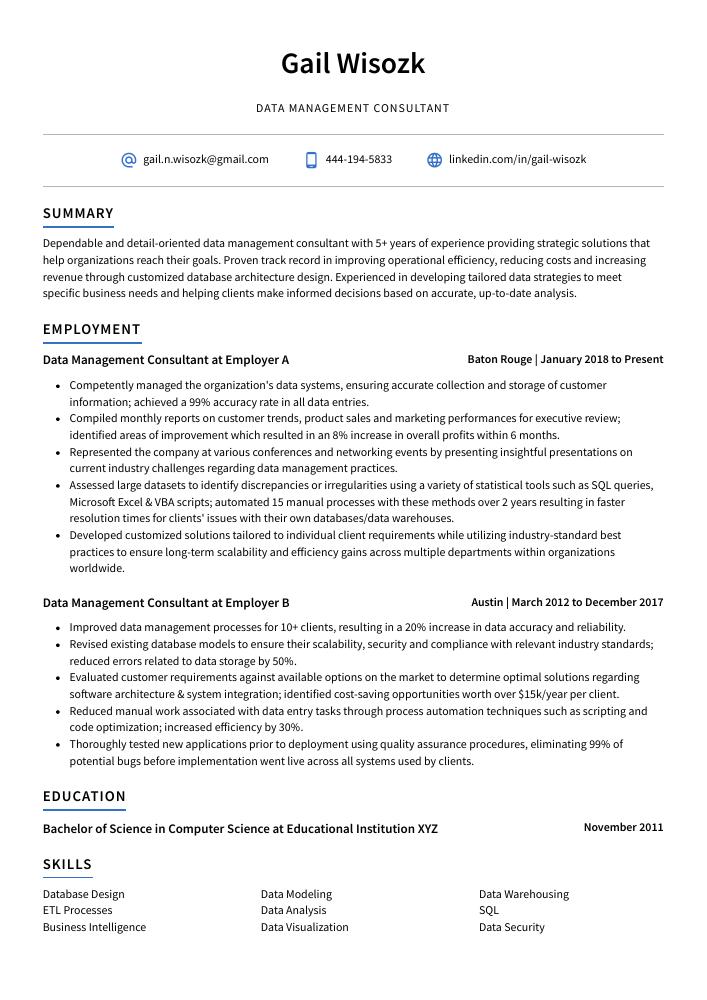Data Management Consultant Resume Guide
Data management consultants provide expertise in organizing and managing data for their clients. They analyze existing systems, recommend improvements, design new databases, develop policies to ensure the security of sensitive information, and oversee implementation of changes.
Data management is your bread and butter, but prospective employers won’t know that unless you tell them. To make sure they recognize your expertise in the field, it’s essential to write a resume that stands out among other applicants.
This guide will walk you through the entire process of creating a top-notch resume. We first show you a complete example and then break down what each resume section should look like.
Table of Contents
The guide is divided into sections for your convenience. You can read it from beginning to end or use the table of contents below to jump to a specific part.
Data Management Consultant Resume Sample
Gail Wisozk
Data Management Consultant
[email protected]
444-194-5833
linkedin.com/in/gail-wisozk
Summary
Dependable and detail-oriented data management consultant with 5+ years of experience providing strategic solutions that help organizations reach their goals. Proven track record in improving operational efficiency, reducing costs and increasing revenue through customized database architecture design. Experienced in developing tailored data strategies to meet specific business needs and helping clients make informed decisions based on accurate, up-to-date analysis.
Experience
Data Management Consultant, Employer A
Baton Rouge, Jan 2018 – Present
- Competently managed the organization’s data systems, ensuring accurate collection and storage of customer information; achieved a 99% accuracy rate in all data entries.
- Compiled monthly reports on customer trends, product sales and marketing performances for executive review; identified areas of improvement which resulted in an 8% increase in overall profits within 6 months.
- Represented the company at various conferences and networking events by presenting insightful presentations on current industry challenges regarding data management practices.
- Assessed large datasets to identify discrepancies or irregularities using a variety of statistical tools such as SQL queries, Microsoft Excel & VBA scripts; automated 15 manual processes with these methods over 2 years resulting in faster resolution times for clients’ issues with their own databases/data warehouses.
- Developed customized solutions tailored to individual client requirements while utilizing industry-standard best practices to ensure long-term scalability and efficiency gains across multiple departments within organizations worldwide.
Data Management Consultant, Employer B
Austin, Mar 2012 – Dec 2017
- Improved data management processes for 10+ clients, resulting in a 20% increase in data accuracy and reliability.
- Revised existing database models to ensure their scalability, security and compliance with relevant industry standards; reduced errors related to data storage by 50%.
- Evaluated customer requirements against available options on the market to determine optimal solutions regarding software architecture & system integration; identified cost-saving opportunities worth over $15k/year per client.
- Reduced manual work associated with data entry tasks through process automation techniques such as scripting and code optimization; increased efficiency by 30%.
- Thoroughly tested new applications prior to deployment using quality assurance procedures, eliminating 99% of potential bugs before implementation went live across all systems used by clients.
Skills
- Database Design
- Data Modeling
- Data Warehousing
- ETL Processes
- Data Analysis
- SQL
- Business Intelligence
- Data Visualization
- Data Security
Education
Bachelor of Science in Computer Science
Educational Institution XYZ
Nov 2011
Certifications
Certified Data Management Professional (CDMP)
Institute for Certified
May 2017
1. Summary / Objective
Your resume summary should be a short and concise snapshot of your experience as a data management consultant. Include information about the databases you have worked with, any certifications or qualifications you possess, and how you have helped organizations improve their data management systems in the past. Also mention any awards or recognition that demonstrate your expertise in this field.
Below are some resume summary examples:
Diligent data management consultant with 10+ years of experience in data analysis, database optimization and ETL design. Skilled at designing data models to support business needs as well as developing strategies for improving current processes. Proven success leading large-scale projects that have enabled businesses to increase their profitability by 20%. Specialize in leveraging cutting-edge technology to create efficient solutions for complex problems.
Seasoned data management consultant with 8+ years of experience helping clients manage and optimize their data systems. At XYZ Consulting, successfully implemented a new database system that increased productivity by 20% for 15 different projects. Received 95% positive feedback from customers on the quality of work delivered. Expertise in managing big data sets, developing databases, and creating reporting tools to help optimize business operations.
Well-rounded data management consultant with 10+ years of experience in the field. Proven ability to design and implement data-driven solutions that increase efficiency, reduce cost, and improve customer satisfaction. Expertise in developing scalable systems for collecting, storing, analyzing and reporting on large volumes of data. Experienced in leading teams of developers through end-to-end project delivery cycles for high profile clients.
Detail-oriented data management consultant with 8+ years of experience helping clients develop and implement sound data systems. Expertise in the areas of database design, business intelligence analysis, ETL development, and big data analytics. Proven track record for streamlining operations to reduce costs by 20-30%. Seeking an opportunity to join ABC Consulting as a Data Management Consultant to drive successful project outcomes.
Accomplished data management consultant with 8+ years of experience optimizing data infrastructure for a wide range of clients. At XYZ Consulting, successfully led the implementation and integration of new systems, resulting in increased efficiency by 25%. Seeking to bring my extensive knowledge and creative problem-solving skills to ABC Consultants to help create optimal solutions for their unique customer challenges.
Determined data management consultant with 5+ years of experience solving complex business problems through effective data analysis, modeling and strategy development. Seeking to join ABC Consulting to apply my skills in designing and implementing cutting-edge solutions for clients across the country. At XYZ, led a project that improved customer service by 20% while reducing costs by 10%.
Driven data management consultant with 7+ years of experience in data analytics, business intelligence and process improvement. Seeking to join ABC Consulting as a Data Management Consultant where I can use my expertise in analyzing current processes and identifying areas for growth. At XYZ Inc., implemented an automated system that increased the accuracy of reporting by 33%.
Hard-working data management consultant with 10+ years of experience in the field. At Company X, identified and resolved data integrity issues that resulted in a 15% increase in efficiency. Currently looking to join ABC Consulting as their next Data Management Consultant to help create innovative solutions for clients while keeping costs down and maximizing profits.
2. Experience / Employment
Next comes the work history section, which should be written in reverse chronological order. Stick to bullet points here, as it makes the information easier for the reader to digest.
When writing out your details, make sure you provide specifics on what you did and any quantifiable results that were achieved. For instance, instead of saying “Maintained data integrity,” you could say, “Implemented a new system for tracking customer records across multiple databases resulting in an average accuracy rate of 98%.”
To write effective bullet points, begin with a strong verb or adverb. Industry specific verbs to use are:
- Analyzed
- Managed
- Optimized
- Consolidated
- Structured
- Implemented
- Monitored
- Documented
- Automated
- Streamlined
- Evaluated
- Researched
- Developed
- Assessed
- Reported
Other general verbs you can use are:
- Achieved
- Advised
- Compiled
- Coordinated
- Demonstrated
- Expedited
- Facilitated
- Formulated
- Improved
- Introduced
- Mentored
- Participated
- Prepared
- Presented
- Reduced
- Reorganized
- Represented
- Revised
- Spearheaded
- Utilized
Below are some example bullet points:
- Expedited data migration processes by 40% while overseeing the successful transition of 5+ databases from legacy to modern systems.
- Demonstrated expertise in database design and development, designing 3 custom data models for clients that were deployed with zero errors or disruptions.
- Successfully maintained uptime and performance of all client-facing systems; reduced server latency issues by 60%.
- Advised clients on best practices related to data management, storage & retrieval strategies while developing customized solutions tailored to each organization’s needs.
- Documented over 300 individual SQL commands used during projects and provided detailed overviews outlining key findings & results for senior executives at various departments within organizations.
- Consolidated and managed over 500GB of data from multiple sources, resulting in an increase of 20% in overall efficiency.
- Analyzed large datasets to identify trends and correlations, generating up-to-date insights into business operations that enabled informed decision making by senior leadership.
- Facilitated the development and implementation of a new database management system; significantly reduced weekly maintenance hours by 25%.
- Accurately identified areas for improvement within existing databases and implemented changes to ensure compliance with industry standards such as GDPR regulations.
- Achieved 95% accuracy rate when inputting new information into company databases; successfully processed 150+ customer records per day on average during peak season months easily surpassing targets set out at beginning of each year.
- Consistently structured and managed large databases containing millions of records, achieving a 20% increase in data accuracy while reducing storage costs by $15,000.
- Spearheaded the design and development process for two major cloud-based platforms; identified potential risks to ensure seamless transition from legacy system to new environment.
- Utilized advanced analytics tools (Tableau/Power BI) to analyze complex datasets and identify patterns & trends that informed strategic business decisions across multiple departments within the organization.
- Prepared detailed reports summarizing data findings on a monthly basis for executive review; enhanced team collaboration by ensuring all stakeholders had access to up-to-date information at any time during projects or initiatives.
- Developed custom scripts using SQL queries for automating day-to-day tasks related to data management such as cleaning, transforming, loading and validating new datasets – resulting in an average 45% reduction in manual labor hours per week.
- Developed and implemented data management strategies for 8 clients, resulting in a substantial 20% reduction in costs and improved customer satisfaction.
- Coordinated with stakeholders to understand their needs and develop user-friendly databases that increased productivity by 40%.
- Streamlined processes related to the collection, storage, analysis and interpretation of data; achieved 80% accuracy rate while saving 50 hours a month on manual tasks.
- Monitored system performance metrics using SQL queries to identify trends & anomalies; automated processes which reduced volumes of manual input by 60%.
- Substantially enhanced reporting capabilities through proactive performance tuning & optimization techniques, increasing overall efficiency by 30%.
- Participated in over 40 data management projects, increasing the accuracy of customer information by 36% while decreasing processing time by 14 hours.
- Presented key findings and insights to clients on a regular basis, leading to more effective marketing strategies that boosted profits by $50,000 in 3 months.
- Mentored junior team members in data analysis techniques and provided feedback to ensure quality assurance across all projects; assisted with training 10+ new staff members for successful onboarding within 4 weeks of hiring.
- Reliably operated various software platforms including Excel & Access for organizing large volumes of data into comprehensive reports that reduced manual labor costs by 20%.
- Formulated innovative methods for capturing customer trends through real-time analytics which resulted in an 11% increase in sales from repeat customers over the course of 6 months.
- Optimized data management processes to improve speed and efficiency by 40%, resulting in a 25% reduction of operating costs.
- Reported on data trends and insights, creating detailed analysis reports for stakeholders using SQL, Tableau and Microsoft Power BI tools.
- Automated weekly database backups with scheduled scripts, ensuring the safety of all sensitive information stored within the network at all times.
- Reorganized existing databases into more efficient structures according to client needs; improved data access speed by up to 32%.
- Effectively trained 10 new employees on proper data entry procedures over 2 weeks, leading to an increase in accuracy rate from 75%+ during that period.
- Introduced data management best practices, guidelines and strategies to optimize the processing of large volumes of data; achieved up to 20% improvement in database performance.
- Proficiently utilized SQL queries, Python scripts and other software tools to maintain databases, consolidate storage systems and ensure accuracy of data records.
- Implemented automated processes for efficiently organizing information from multiple sources into a single repository; decreased manual sorting time by 40%.
- Researched emerging technologies related to big data analytics while staying abreast with new industry trends; identified potential cost savings opportunities amounting up $7000 annually.
3. Skills
The skillset employers require in an employee will likely vary, either slightly or significantly; skimming through their job adverts is the best way to determine what each is looking for. One organization may be looking for someone with experience in data analysis and another may require expertise in database management.
It is important to tailor the skills section of your resume according to each job that you are applying for, as many employers use applicant tracking systems these days. These programs scan resumes for certain keywords before passing them on to a human; if yours doesn’t contain any relevant ones, it won’t make it past this stage.
In addition to listing the most pertinent skills here, you should also discuss them further in other areas such as work experience or summary sections.
Below is a list of common skills & terms:
- Big Data Technologies
- Business Intelligence
- Data Analysis
- Data Modeling
- Data Security
- Data Visualization
- Data Warehousing
- Database Design
- ETL Processes
- SQL
4. Education
Mentioning your education section on your resume will depend on how far along you are in your career. If you just graduated and have no prior experience, mention your education below the resume objective. On the other hand, if you have been working as a data management consultant for many years with plenty of responsibilities to showcase, omitting the education section is perfectly fine.
If an education section is included, try to list courses or subjects related to data management that are relevant to the job role you are applying for.
Bachelor of Science in Computer Science
Educational Institution XYZ
Nov 2011
5. Certifications
Certifications are a great way to demonstrate to potential employers that you have the knowledge and skills necessary for the job. They are also evidence of your commitment to professional development, showing that you take initiative in keeping up with industry trends and standards.
Including any certifications relevant to the position on your resume can be an effective way of making yourself stand out from other applicants. This is especially true if they are not widely held or require significant effort or investment in order to obtain them.
Certified Data Management Professional (CDMP)
Institute for Certified
May 2017
6. Contact Info
Your name should be the first thing a reader sees when viewing your resume, so ensure its positioning is prominent. Your phone number should be written in the most commonly used format in your country/city/state, and your email address should be professional.
You can also choose to include a link to your LinkedIn profile, personal website, or other online platforms relevant to your industry.
Finally, name your resume file appropriately to help hiring managers; for Gail Wisozk, this would be Gail-Wisozk-resume.pdf or Gail-Wisozk-resume.docx.
7. Cover Letter
Providing a cover letter to accompany your resume is a great way to stand out from the competition. It gives you the opportunity to express yourself in more detail and explain why you are an ideal candidate for the job.
A cover letter usually consists of 2-4 paragraphs that provide additional information about who you are, what skills and experience make you well suited for the role, as well as any other relevant information not already mentioned on your resume. Whilst submitting a cover letter may not be mandatory for most jobs, it can certainly give employers greater insights into who they should consider hiring.
Below is an example cover letter:
Dear Gerson,
I am writing to apply for the position of Data Management Consultant at your company. As a data analyst with over five years of experience working in various industries, I have gained a deep understanding of data management principles and best practices. In my previous role as a data analyst at [company name], I was responsible for designing and implementing comprehensive data management solutions that increased efficiency and decreased costs across the organization.
Through my work experiences, I have developed strong project management skills and am confident in my ability to lead large-scale projects from start to finish. I am also an expert in using various data analysis tools and software, such as Excel, Tableau, SQL, and SAS. In addition, I have excellent communication skills that allow me to effectively communicate complex technical concepts to non-technical audiences.
I believe that my skills and experience make me an ideal candidate for this position, and I am eager to put my expertise to work for your company. I look forward to speaking with you about this opportunity soon. Thank you for your time and consideration.
Sincerely,
Gail
Data Management Consultant Resume Templates
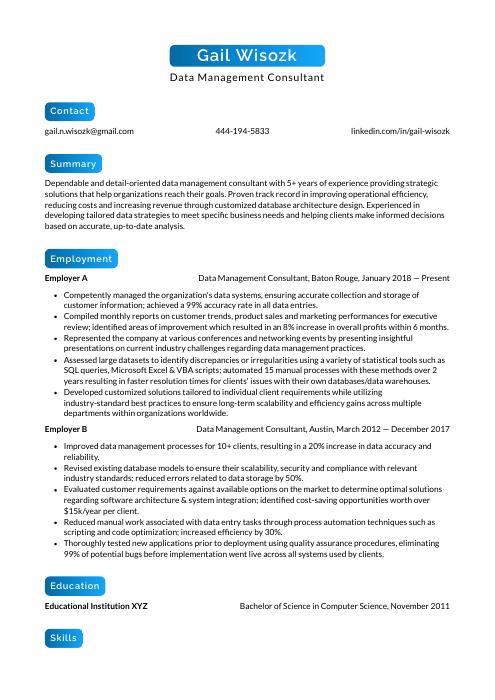 Kinkajou
Kinkajou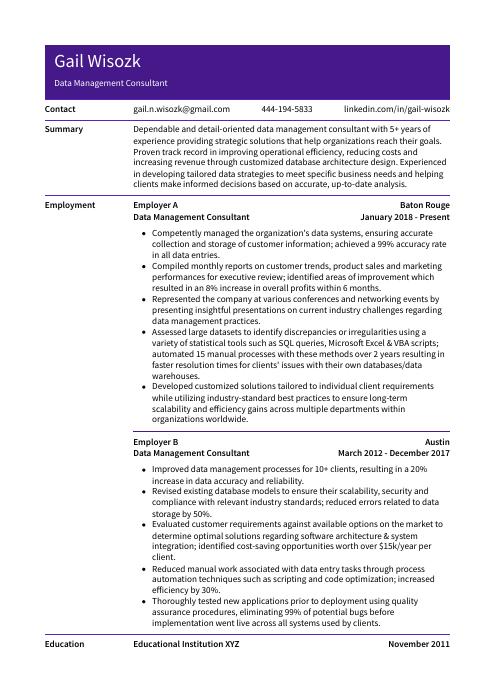 Pika
Pika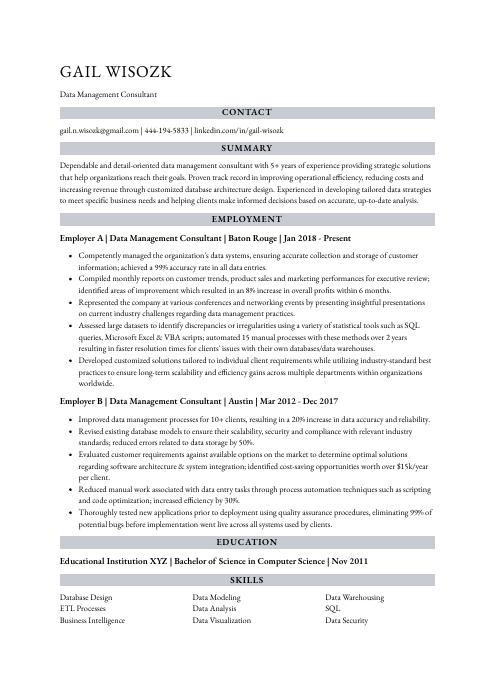 Numbat
Numbat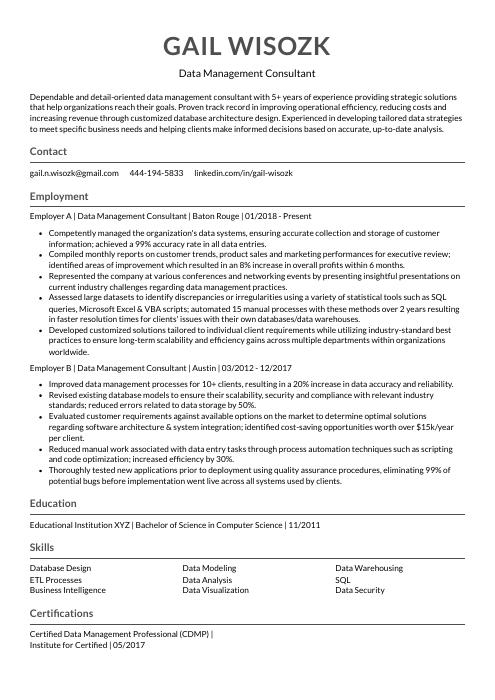 Indri
Indri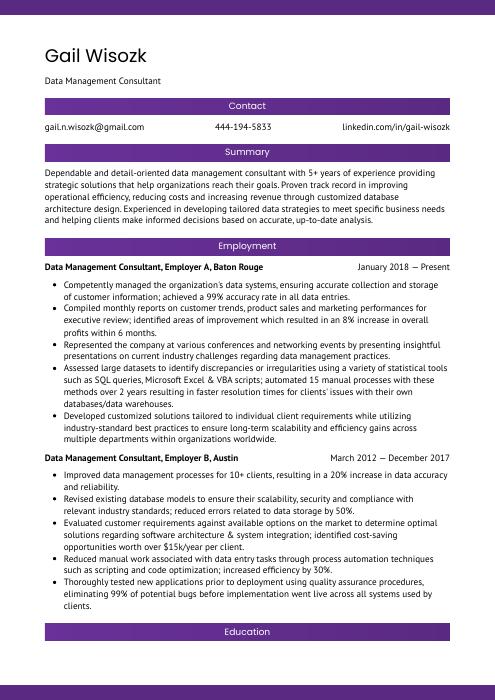 Jerboa
Jerboa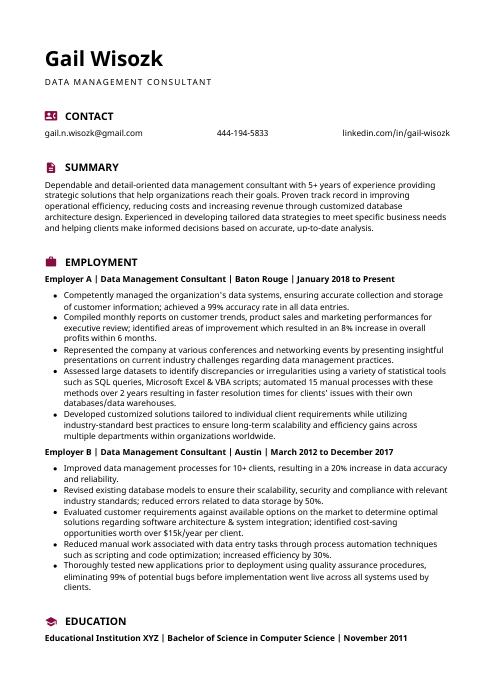 Hoopoe
Hoopoe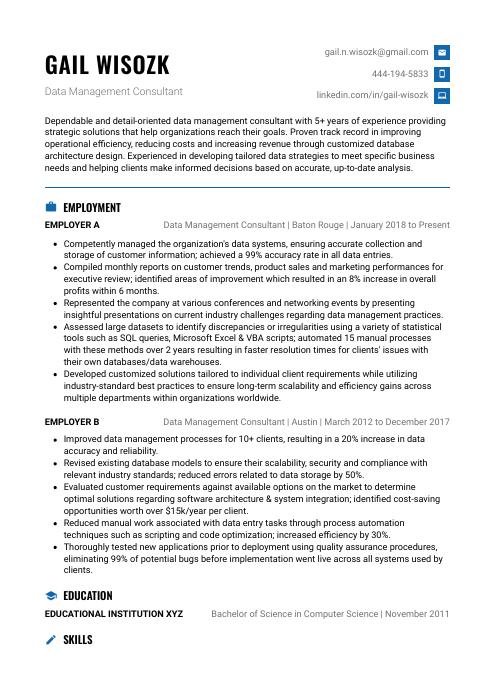 Echidna
Echidna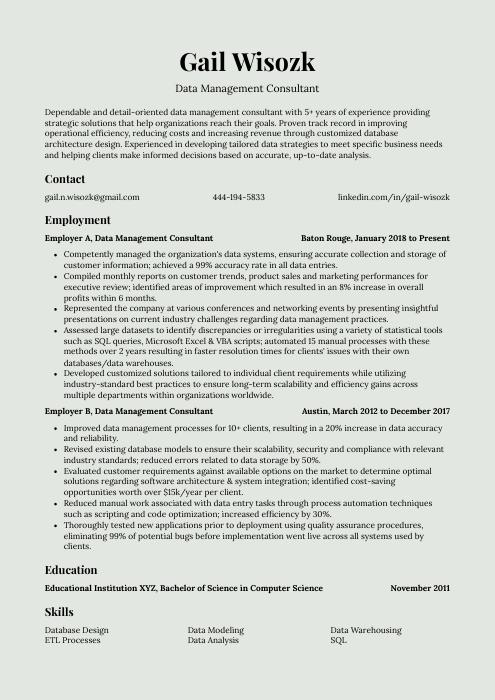 Saola
Saola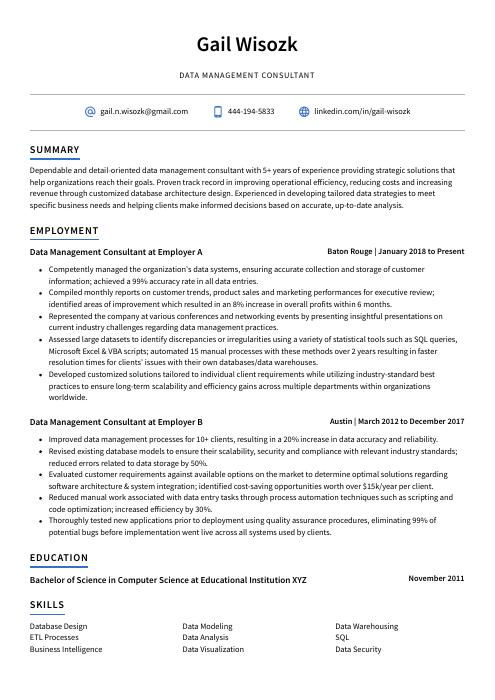 Axolotl
Axolotl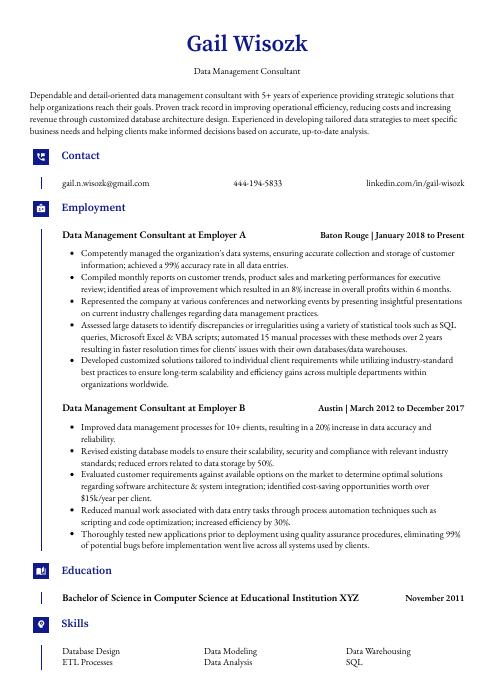 Gharial
Gharial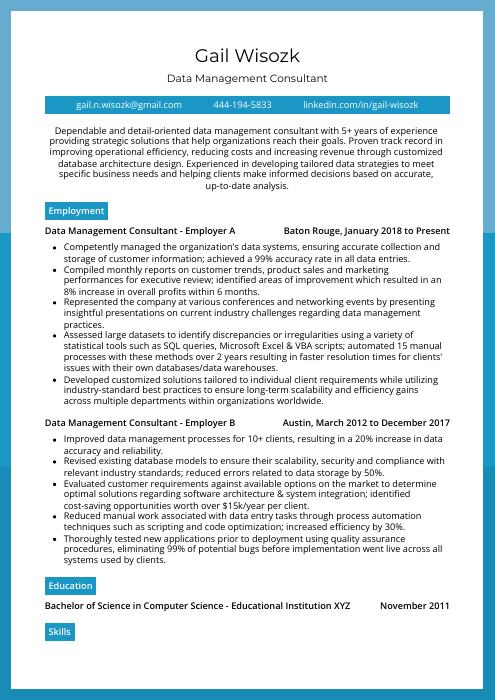 Rhea
Rhea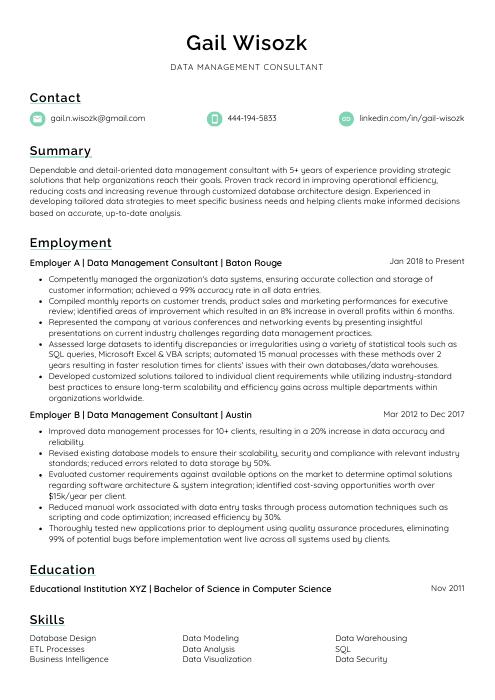 Lorikeet
Lorikeet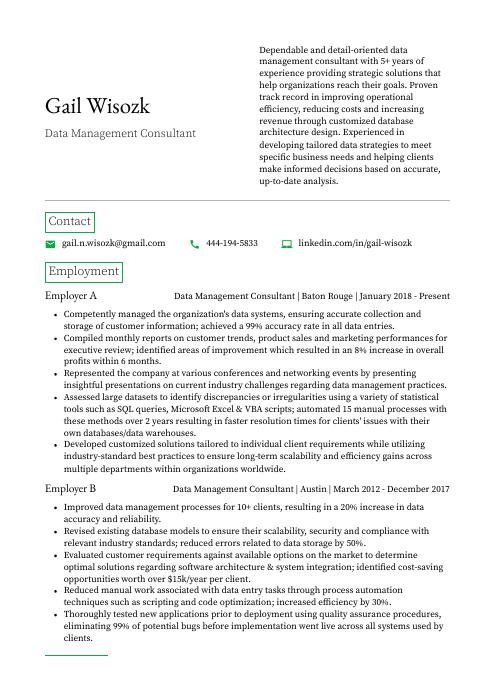 Quokka
Quokka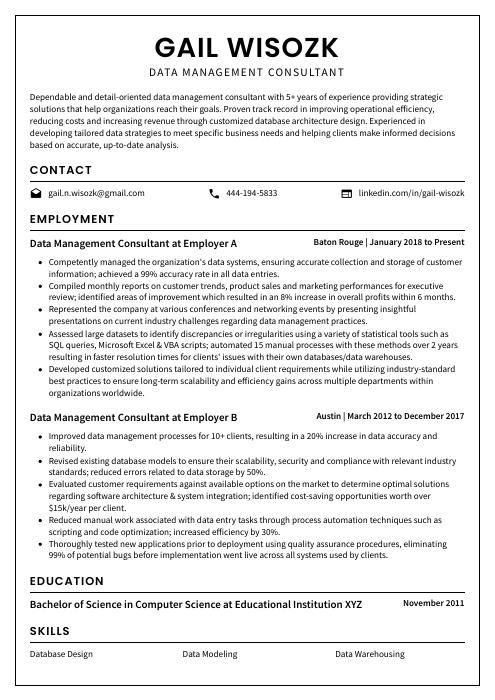 Cormorant
Cormorant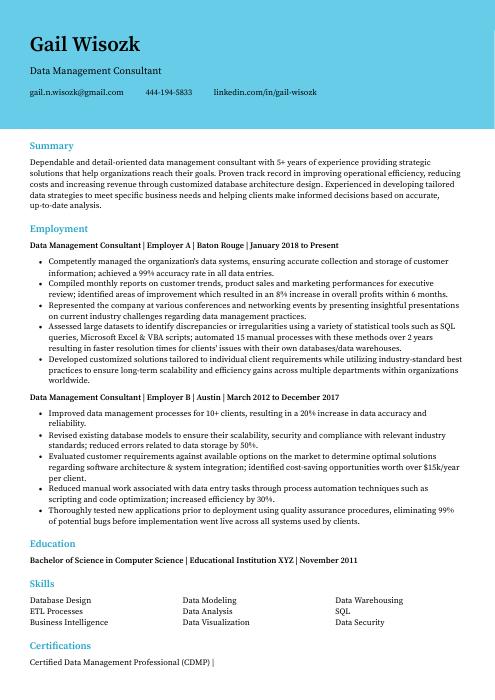 Dugong
Dugong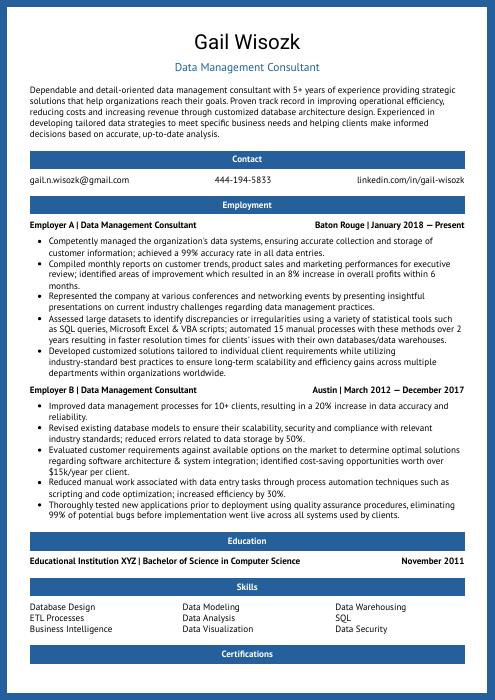 Ocelot
Ocelot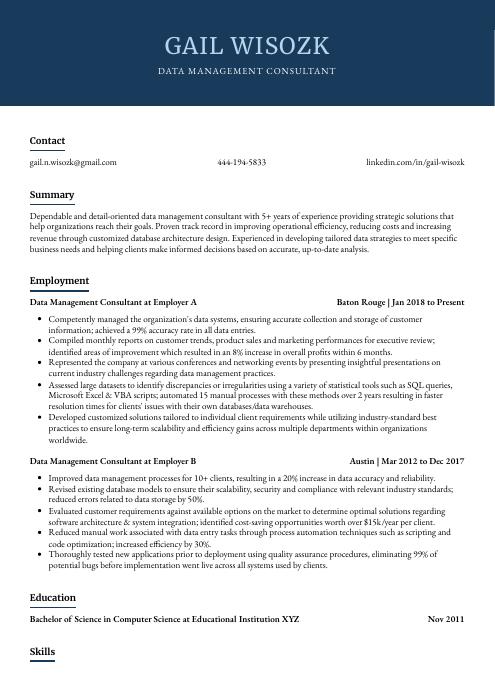 Bonobo
Bonobo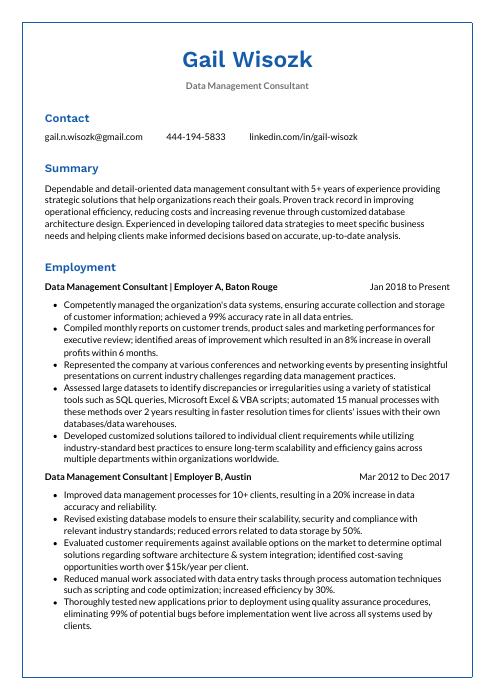 Markhor
Markhor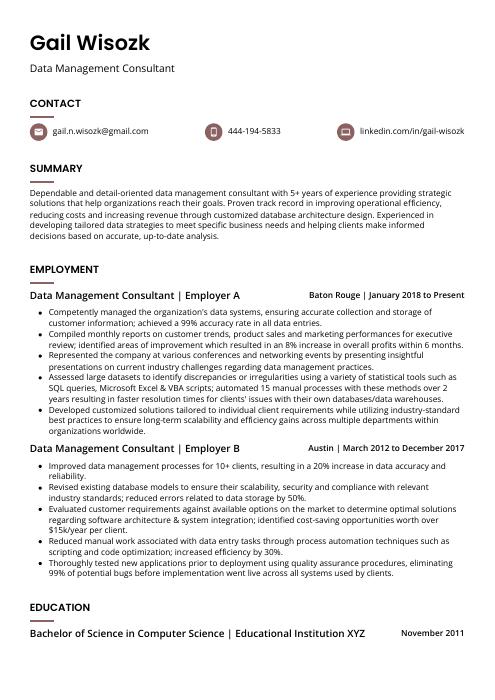 Fossa
Fossa Rezjumei
Rezjumei
